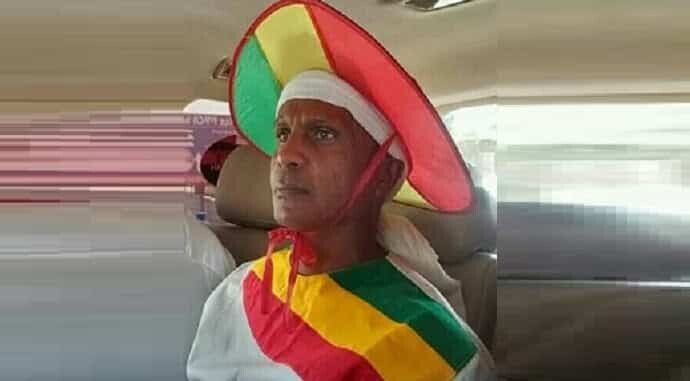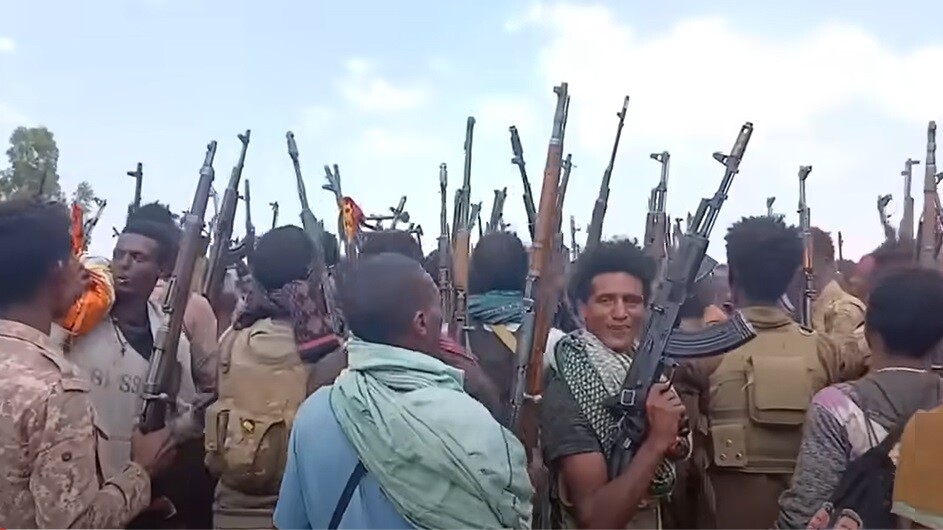
It is challenging to encapsulate the essence of Eskender Nega’s character in words. My initial face-to-face encounter with Eskender took place in December 2019 in New York City. Eskender was there to present compelling evidence of an ongoing and imminent genocide against the Amharas of Ethiopia to the United Nations Office of Genocide Prevention. He made another appearance in May 2022, emphasizing the urgent need for action from the United Nations.
As an Ethiopian American, I’ve always admired Eskender’s relentless efforts to promote democratic governance in Ethiopia. His wife, Serkalem Fasil, a journalist and publisher of many newspapers , even gave birth to their only child , Nafkot , while serving a prison term on fabricated charges imposed by the ruling regime due to their advocacy for democracy and opposition to ongoing injustice . Both have faced imprisonment over a dozen times in the past.
Living in New York City for an extended period, I’ve often volunteered to assist Ethiopians arriving in the city for social and political events. Eskender, arriving at Pennsylvania Station before 10:00 am, was accompanied by Shemeles Legess, a prominent political figure. After a cordial greetings and introduction I offered them breakfast and snacks, which they politely declined.
This wasn’t the first time both had been to New York City. Given the chilly December weather, I thought offering them a taxi ride would be appropriate. Despite the cold, both of them were dressed very lightly and didn’t have gloves to ward off the winter chill. The idea of picking
up gloves and a jacket crossed my mind, but they politely declined. As we walked, they engaged in conversation, sharing their thoughts on the New York City skyline, art deco buildings, brownstones, and other grand structures. It was evident that Eskender possessed a special ability to compartmentalize, multitask, appreciate his surroundings, and simultaneously think and plan for his mission.
At our meeting point, over half a dozen Ethiopians gathered to support Eskender. They were eager to listen and discuss his planned presentation with United Nations officials. As lunchtime approached, I volunteered to buy snacks and coffee for our guests. I noticed a specific request from Eskender and Shemeles for black coffee without dairy, while the others in the group opted for coffee with milk or cream.
“While waiting to be escorted inside the United Nations cafeteria, I extended an invitation to Eskender and Shemelese, asking if they would like to grab a bite before the meeting. Eskender promptly replied, ‘Just get me some potato chips and a soda,’ a request to which I willingly complied. As everyone made their selections from the available options.
“Eskender spent over two hours meticulously outlining the ongoing and imminent genocide in Ethiopia. He submitted written materials for review, including reports by reputable organizations such as Amnesty International, Human Rights Watch, the Ethiopian Human Rights Council, and various Civil Societies. Newspaper articles, including coverage from the New York Times. Notably, he presented a powerful testimonial from a survivor at a genocide survivors’ shelter via telephone. Prior to his visit to the European Court of Human Rights and the United Nations Office, Eskender had personally visited these shelters at various locations.
After a long yet productive day, it was time to head north to a hastily arranged gathering in a small community room. Approximately forty people showed up to meet him, and he delivered a brief overview of his goals at the United Nations along with his “out of the foxhole” message to our community. Without delay, he proceeded to organize interviews on Ethiopian media platforms for himself and Prof. Getachew Haile to discuss the day’s work. To conduct the interview, they needed a quiet place away from the community room, which I promptly arranged within the same premises.
Eskender’s request for dark coffee and potato chips lingered in my mind. It eventually dawned on me that it was December, coinciding with the ‘Fast of the Prophets’, Tsome Gena in the Ethiopian Orthodox Church, shedding light on their dietary choices. Later that evening, we shared a vegetarian dish thoughtfully arranged by our generous friend, Martha Admasu.
Subsequently, we bought a budget bus ticket from Chinatown for a midnight journey to Washington, DC, concluding a long, tiring, yet remarkably productive day at the UN. While many would opt to stay overnight, Eskender chose a subway ride to the Chinatown bus.
Reflecting on Eskender’s character, I recall a touching story from his post-prison release, where fellow inmates gave him a beautifully decorated Bible with the Ethiopian tricolor. This incident, along with my recent interactions, underscores Eskender’s unparalleled devotion,conviction, humility, faith, endurance and willingness to operate in an inconvenient environment, which is striking considering his stature.
In recent days, despite attempts by a few to tarnish Eskender’s name, his honesty, selflessness, and integrity persist as a beacon. Those who question his motives are individuals who haven’t had the opportunity to know him personally and understand his impeccable legacy.
They may lack the comprehension of the cause he is spearheading – the defense of millions displaced, thousands orphaned, and thousands brutally massacred. Additionally, there are millions of defenseless Amharas and other Ethiopians awaiting eradication by a brutal regime.
Some individuals may exhibit an inability to comprehend the gravity of the situation, while others try to conceal their personal insecurities. Some may even feel a sense of guilt for not recognizing the reality in a timely manner to actively contribute and influence events. There are also those who may harbor envy for the unstoppable progress of our valiant leaders, Fanos and Eskender, in which they play no role. Nevertheless, these forces aligned against truth and history are destined for failure.
Eskender currently resides among fellow patriots, deeply immersed in the challenging yet fulfilling tapestry of their day-to-day lives. There’s no need to dwell on the whereabouts of those undeserving attention-seekers and the fickle currents of today. He navigates the path fate lays before him, addressing the tasks that demand his attention. Devoted to his beliefs and convictions, Eskender is unwavering in his commitment to what he sees as his calling. With resolute determination for both his life and the love he holds for his country, nothing will divert him from realizing God’s purpose for his life and answering the millions who yearn for freedom. Eskender, now we all know what self sacrifice is: you lead by example, the current and future generations will honor you. Thank you for being a blessing to all those who know you.
Taddesse Sintayehu Solomon aka Dogo Aba bora
January,17,2024

















I am very politely asking the following question. When I do that I don’t mean disrespect to this young man and his peers.
What is the objective of his movement? Does his group have a political program? If so where can we find and read all about it?
Those groups wreaking havoc in Western Wallagaa have made their objective very clear. Their problem is my Oromos know how to single out a cross-eyed bee among a swarm of hundreds of thousands. That is to liberate me and my upright Oromos. My foot!!!!
So What is Obbo Eskinder and his group’s objective/political program?
Peace y’all!!!!